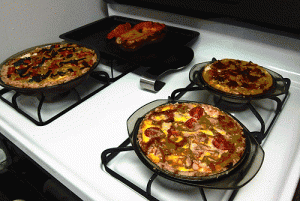I had today’s blog post all planned. It was to be punnily titled, “Hugs and quiches”, or maybe “Quiche and tell.” You see, I’d been inspired to make a three quiche sampler lunch — the sweet butternut and caramelized onion one, offsetting the tarter tuna, roast cherry tomato and shaved piave one; perfectly counterbalanced by a roasted red and yellow pepper quiche. But a short while after finishing our lunch, J witnessed something falling from the building next door. He yelled out, cut the call he was on, and called 911.
The already drizzly day got darker. It seems something convinced a 21-year-old man to jump off the balcony of an apartment. Because of the way our building is situated we had an unfortunate perfect view of the landing, and had to work relentlessly at distracting C’s curiosity about what was going on as a wave of police vehicles were followed by the fire brigade. An ambulance wasn’t necessary.
Death is the destination we all share, but a death in such a fashion is particularly sombre.
Death does bring people together. Many expats call our apartments home, and a few shared in a discussion with our concierge about the tragedy. The interesting perspective overheard when I was on the way out to run errands, was how suicide seemed to some like a “luxury” afforded to well developed countries when compared to the daily life and death struggles of young people in less fortunate societies. There people don’t kill themselves because they’re fighting so hard to survive everyday.
I turned the event over in my mind as I ‘swam’ my way across Manhattan in this afternoon’s deluge and wind, sending a prayer for a soul lost and the parents, family and friends for whom today will forever be a black day. This preoccupation had an absurd result. A teller asked me how my day was when I was paying for our groceries. I couldn’t help answering, ‘Not good. One of our neighbours committed suicide, ” to which she replied, “Oh isn’t that nice!” and carried on scanning our food.
But the most unsettling part of this incident was that after cordoning off a very large area and shutting off traffic movement on our one-road island, the body lay in the road for hours. Literally more than four hours. For a time there it was completely visible. Then under a white sheet. Eventually a blue tarpaulin. Laying face down in the pouring rain. Alone, at the centre of a polygon of ‘Police line do not cross’ tapes. We managed to prevent C from taking note of this.
I finished my errands and returned home after 7pm. The cab had to stop and drop me off in the street as the street was still closed. I stopped, laden with bags, to speak with one of the officers and ask why they left him there for so long. Apparently they had to wait for the Medical Examiner to come before the body could be moved. They’d arrived a little earlier. As I walked around to our building, a team was hosing down the street.
Death changes everything, usually for those who know the individual. This death will leave a long shadow, because we — like our neighbours — walk across the spot where he landed everyday. To the supermarket. To the bus. To the parking garage. To the post office. To the green market. At least this time the person didn’t narrowly miss hitting me as happened some years ago, here in New York, when a “jumper” hit the car I was walking past, two feet to my left. Big city life indeed.
(You can read about the reaction of fellow island residents on the Roosevelt Islander — ranging from ire to praise of the local public safety — a.k.a. police. We found them very helpful and organized.)

One response
Tanya,
it is so sad to experience such a tragedy. You have captured the emotions in a very understanding way. I am sorry you had to experience this, but your comprehension of what happened is remarkable. Death is rarely experienced first hand. We normally get phone calls, e-mails, or read obits. Your son is a special person and we can’t wait to be with you all again soon! Love, Pat